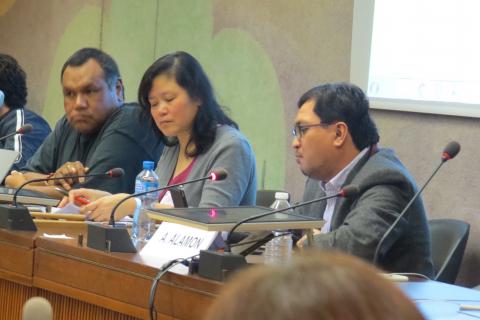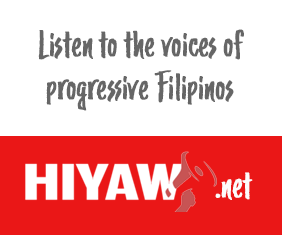IP experiences on extractive industries discussed in UN business and rights parallel session
16 November 2015, Geneva, Switzerland—Indigenous representatives from countries in Asia, Latin America and the United States come together to present their experiences on the mechanisms for redress in the light of extractive industries entering their ancestral lands.
The international business community gathers today in Geneva for the fourth Forum on Business and Human Rights organized by the Office of the Higher Commission on Human Rights. To air the voices of the indigenous communities directly impacted by these businesses, a parallel session titled ‘Recognizing Indigenous Peoples’ Rights to Land, Territories and Resources, and Challenges in their Access to Mechanisms for Redress’ has been organized.
The session opens with a short video from the Philippines which presents the killings of an indigenous leader by state-backed paramilitary forces, motivated by their promotion of the entry of mining in an ancestral domain.
“Right now we have more than 4000 indigenous peoples displaced in the Philippines who cannot come home to their communities because of the continuing military and paramilitary attacks,” said Angelica Gonzales of the International Coalition for Human Rights in the Philippines introducing the session, bridging from the short documentary. “And this is just in the Philippines.”
Other presentations show that despite laws that are in place both in national and international levels, the rights of indigenous peoples continue to be violated.
“In our country, we hear a lot about our leaders getting threatened,” said Carlos Gualtero from the Colombia-based Consejo Regional Indigena del Tolima. “In some cases, some have been assassinated so they cannot do the lobbying and defend their rights.”
“Businesses in general avoid Free Prior and Informed Consent (FPIC). They know they will always have a negative environmental impact. In Colombia, the situation is the same [as in other countries]. The states are corrupt because of the businesses. They do not make demands on these businesses.”
In two of the presentations, failure of national laws have led to the victimization of the indigenous peoples by their own governmental systems. Michael Hill from the Apache Nation presents the recent military bill that has allowed the taking of their land, which is their spiritual center. “In our language, n’de (pronounced as en-da) [referring to the military bill NDAA National Defense Authorization Act] means enemy. This place [their ancestral land taken away through NDAA] is a site of commerce for many tribes prior to colonization in trading and bartering goods.”
Arnold Alamon of the Philippines points out that the Indigenous Peoples Rights Act has been used to force indigenous peoples to agree to streamlined permits that allow extractive industries access to their ancestral lands.

“Instead of working for the indigenous peoples, what is happening in some countries – like the Philippines – the laws victimize the indigenous communities, are used by businesses so that they can force their entry into the ancestral lands,” said Alamon, a sociology professor of the Mindanao State University-Iligan Institute of Technology and executive editor of the Mindanao Interfaith Institute on Lumad Studies, prior to the start of the session. Many of the government economic policies promote the entry of resource-extractive industries in the still rich ancestral lands.
“87 Lumad schools are threatened with closure, three have ceased operating, throwing more than a thousand indigenous students from school. One of the closures was after the killing of their school director Emerito Samarca. What fuels this madness in Mindanao is the lucrative potential for mining,” he said in his presentation.
Some traditional remedies were also discussed. “We bring on the shame game – doing spiritual prayers. This is our redress. We are going directly to the creator,” said Hill. “We will act in that way, and behave in that way in a manner that is connected to the earth as woman’s ways. We also need to step back as nations and come back down to earth and find out what’s happening to our systems.”
A social- environmental monitoring done by the Guarani young professionals in the Chiquisaca District in Bolivia was also shared. “The community fought for respect and they got it,” said Lorena Terrazas of the Red Pazinde who clarified that the scheme they had set up had not been readily given to them. They also fought hard which had forced Repsol, the oil company they are now working together with, out of their lands. “Nothing is perfect but I think we are moving forward.”
Coordinated by the Rural Missionaries of the Philippines-Northern Mindanao Region (RMP-NMR) Inc, the parallel session was co-organized with Incomindios, Latin America Mining Monitoring Program, Red PAZINDE, Asia Indigenous People’s Network on Extractive Industries and Energies, and the Indigenous Peoples’ Movement for Self-Determination and Liberation. Organizations like Civicus, World Council of Churches-Ecumenical Advocacy Alliance, and the CSO Partnership for Development Effectiveness also co-organized the event.###



